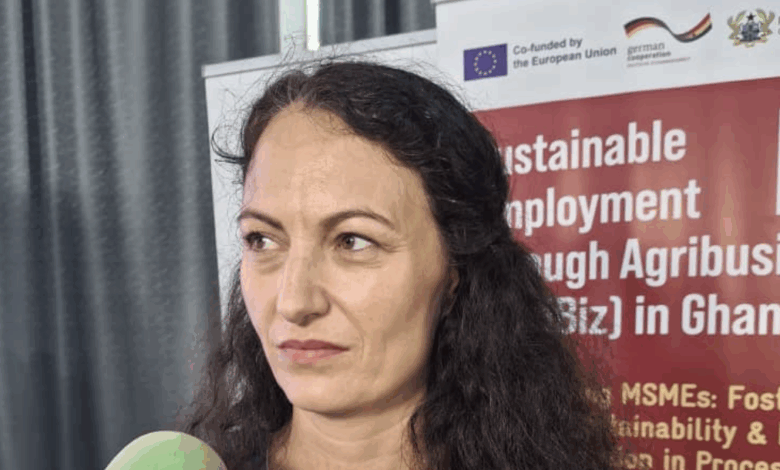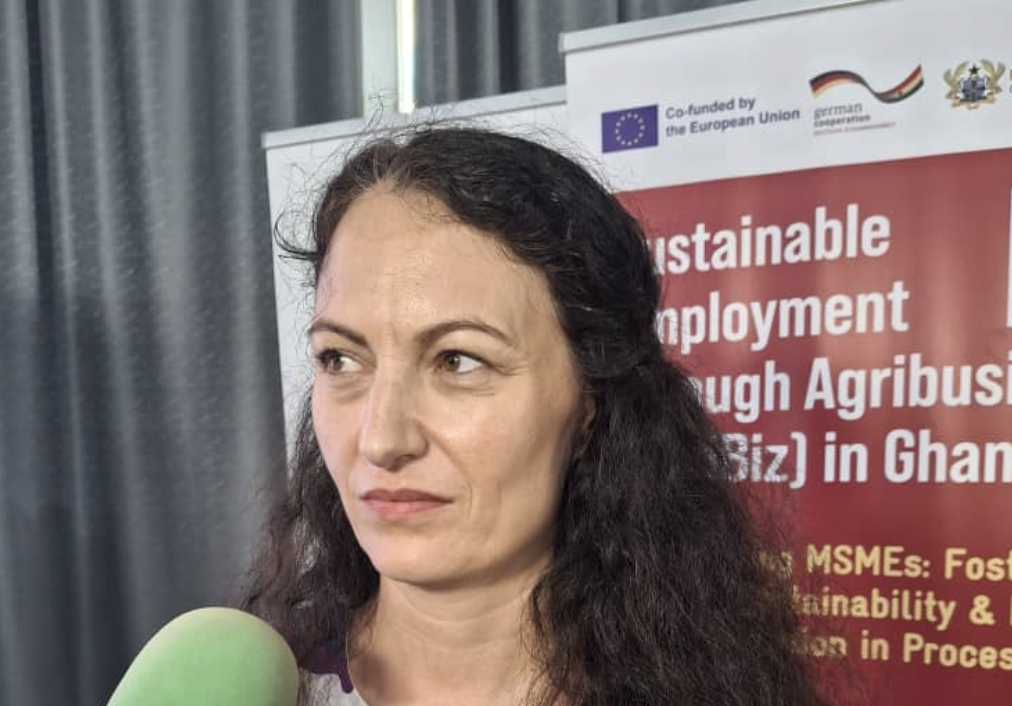Ghana’s agribusiness sector poised for growth – Trade Ministry


Sarah Rüffler Commission Manager of the Sustainable Employment Through Agribusiness in Ghana (AgriBiz) – GIZ
The Ministry of Trade, Agribusiness, and Industry has praised the impact of the Sustainable Employment Through Business (Agribusiness) Programme, implemented by GIZ Ghana, in transforming the sector.
Speaking at the closing ceremony of the project in Accra, Kwame Oppong Ntim, Director for Agribusiness at the Ministry, highlighted the programme’s achievements, including the establishment of a comprehensive monitoring and evaluation framework, stakeholder ecosystem mapping, and support for 14 business organisations, including associations of women, youth, exporters, and farmers.
“The activities carried out by Agribusiness are phenomenal,” Ntim said. “
This includes a comprehensive monitoring and evaluation framework and a stakeholder ecosystem mapping, among others.
“Together, these tools have guided the Ministry and need to continue to guide the Ministry and its partners in translating policy into action, ensuring coordinated, effective, and measurable support for Ghana’s MSME developments with lasting impact.”
Mr Ntim emphasised the importance of a vibrant private sector, noting that it depends on strong, well-organised business associations that can effectively represent members, deliver quality services, and advocate for an enabling business environment.
“The vibrant private sector depends on strong, well-organised business associations that can effectively represent members, deliver quality services, and advocate for an enabling business environment,” Mr Ntim said.
“And through Agribusiness, the Ministry has supported 14 business organisations, including associations of women, youth, exporters, and farmers, to strengthen their institutional capacities and sustainability.”
The programme has also promoted inclusive contract farming, linking farmers directly with industry through transparent and sustainable agreements.
“Inclusive contract farming has proven to be a practical model for linking our farmers directly with industry through transparent and sustainable agreements,” Mr Ntim said.
“It is a key driver of agricultural value chain development and inclusive growth, providing farmers with stable markets, fair prices, and access to quality inputs and modern techniques.”
Ntim expressed gratitude to GIZ Ghana and other partners for their support, noting that the programme’s impact will be sustained through the ministry’s continued efforts to promote agribusiness development.
“We must also note that inclusive contract farming has proven to be a practical model for linking our farmers directly with industry through transparent and sustainable agreements,” Ntim said.
“We will continue to promote certification, strengthen institutional support and data systems, and ensure that our businesses meet the standards required for global competitiveness.”
The AgriBiz programme, Commission Manager Sarah Rüffler, on her part, noted that agribusiness is a critical sector for job creation, employing over 80% of the population.
However, she highlighted that only 20% of Ghana’s produce is processed locally, indicating a significant potential for job creation and economic growth.
“Agribusiness has always been one of the most important topics to tackle when it comes to job creation,” Rüffler said.
“Not only because agribusiness employs more than 80% of the population, but also because challenges remain, particularly when it comes to value addition.”
Rüffler emphasised that access to finance is a major challenge for micro, small, and medium enterprises (MSMEs) in the agribusiness sector, particularly for women in northern Ghana.
To address this, AgriBiz supported the setup of village savings and loans associations, benefiting over 15,000 women.
“We have learned that there are major challenges for instance when it comes to access to finance,” Rüffler said.
“We also found out that our beneficiaries found it very helpful that we could help them and support them to improve the quality of their bookkeeping, for instance, so that subsequently they would be eligible for new financing opportunities.”
The Deputy Head of Development Cooperation at the German Embassy, Daniel Bohme also acknowledged the impact of the programme.
“AgriBiz has made significant contributions to transforming the agricultural landscape in Ghana, fostering inclusive growth, creating jobs, and empowering women across the value chain,” he said.
We remain committed to sustaining these gains and building on the strong partnerships and innovations established under the programme,” Daniel Bohme added.
Speaking on behalf of the European Union Delegation, Paulina Rozcka, the Head of the Infrastructure and Sustainable Development Section, lauded the successful partnership with the German Development Cooperation and the Government of Ghana to develop the agribusiness sector, especially in north-western Ghana.
The closing event, organised under the theme “Celebrating AgriBiz Impact and Partnerships,’ brought together key stakeholders from the public and private sectors as well as civil society, highlighting collaboration for agribusiness development. It showcased the transformative impact on innovation, women’s economic empowerment and quality agricultural production.
Implemented in close collaboration with the Ministry of Trade, Agribusiness and Industry and the Ministry of Food and Agriculture, AgriBiz is commissioned by the German Federal Ministry for Economic Cooperation and Development (BMZ) and co-funded by the European Union.
The Agribusiness Programme has supported 37 agribusinesses, representing over 4,800 agribusinesses, with many reporting increased processing capacity utilisation and revenue growth.
DISCLAIMER: The Views, Comments, Opinions, Contributions and Statements made by Readers and Contributors on this platform do not necessarily represent the views or policy of Multimedia Group Limited.
DISCLAIMER: The Views, Comments, Opinions, Contributions and Statements made by Readers and Contributors on this platform do not necessarily represent the views or policy of Multimedia Group Limited.
Source link





